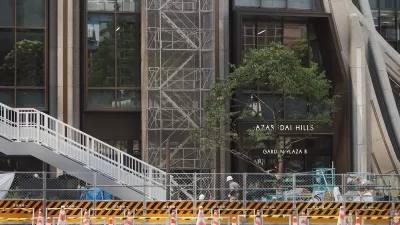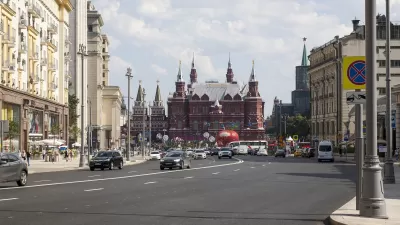Over the weekend it was announced that 71-year-old Japanese architect Toyo Ito has won this year's Pritzker Prize, the most prestigious award in the field. The jury honored Ito for combining "conceptual innovation with superbly executed buildings."
Christopher Hawthorne, architecture critic for the Los Angeles Times, discusses Ito's 40-year body of work and the Pritzker jury's "return to form" after "honoring younger and lesser-known figures in recent years..."
"[Ito] is best known for his 2001 Sendai Mediatheque, a seven-story glass box of a building that was dramatically shaken, though only lightly damaged, by the Tohoku earthquake two years ago," writes Hawthorne. "Like much of his work, it distills a series of complex technical breakthroughs into a spare, even-keeled finished product."
"For Ito, the building’s innovative structural system was the byproduct of an effort to open up space and sightlines inside; his goal was to allow as much interaction and free movement on each floor as possible, so that the building might replicate some of the urban energy of the street outside."
"Ito is the sixth Pritzker winner from Japan, joining Kenzo Tange (1987) and Fumihiko Maki (1993) along with [Tadao] Ando, [Ryue] Nishizawa and [Kazuyo] Sejima," adds Hawthorne. "In a statement, the Pritzker jury, which includes the Supreme Court justice Stephen Breyer as well as architects Glenn Murcutt, Yung Ho Chang and Alejandro Aravena, praised Ito for the ambition of his civic projects, in particular, and for producing buildings that 'seem effortlessly in balance.'"
FULL STORY: Japanese architect Toyo Ito, 71, wins Pritzker Prize

Alabama: Trump Terminates Settlements for Black Communities Harmed By Raw Sewage
Trump deemed the landmark civil rights agreement “illegal DEI and environmental justice policy.”

Study: Maui’s Plan to Convert Vacation Rentals to Long-Term Housing Could Cause Nearly $1 Billion Economic Loss
The plan would reduce visitor accommodation by 25% resulting in 1,900 jobs lost.

Planetizen Federal Action Tracker
A weekly monitor of how Trump’s orders and actions are impacting planners and planning in America.

Waymo Gets Permission to Map SF’s Market Street
If allowed to operate on the traffic-restricted street, Waymo’s autonomous taxis would have a leg up over ride-hailing competitors — and counter the city’s efforts to grow bike and pedestrian on the thoroughfare.

Parklet Symposium Highlights the Success of Shared Spaces
Parklets got a boost during the Covid-19 pandemic, when the concept was translated to outdoor dining programs that offered restaurants a lifeline during the shutdown.

Federal Homelessness Agency Places Entire Staff on Leave
The U.S. Interagency Council on Homelessness is the only federal agency dedicated to preventing and ending homelessness.
Urban Design for Planners 1: Software Tools
This six-course series explores essential urban design concepts using open source software and equips planners with the tools they need to participate fully in the urban design process.
Planning for Universal Design
Learn the tools for implementing Universal Design in planning regulations.
Caltrans
Smith Gee Studio
Institute for Housing and Urban Development Studies (IHS)
City of Grandview
Harvard GSD Executive Education
Toledo-Lucas County Plan Commissions
Salt Lake City
NYU Wagner Graduate School of Public Service





























